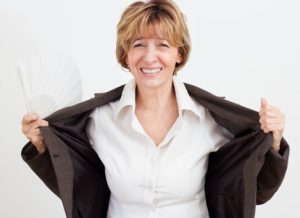 Hot flashes associated with menopause are not experienced the same way by all women, according to the latest findings. Nearly 80 percent of menopausal women get hot flashes or night sweats, but timing and duration of these symptoms vary depending on a number of factors. Namely, body weight, race, education, and dietary habits affect the symptom patterns.
Hot flashes associated with menopause are not experienced the same way by all women, according to the latest findings. Nearly 80 percent of menopausal women get hot flashes or night sweats, but timing and duration of these symptoms vary depending on a number of factors. Namely, body weight, race, education, and dietary habits affect the symptom patterns.
Study author Rebecca Thurston said, “We used to think these symptoms lasted from three to five years, right around the time of the final menstrual period. We now know that these symptoms persist for far longer — typically seven to 10 years — and occur at different times for different women.”
Advertisement
The researchers followed nearly 1,500 women transitioning through menopause over the course of 15 years. Each year, the women were asked to report on their symptoms. Based on their responses, the researchers uncovered the following patterns:
- Early symptom onset beginning 11 years before the final menstruation and declining after menopause
- Symptom onset close to the final menstruation with a later decline
- Early onset with high symptom frequency
- Persistently low symptom frequency
Further analysis focused on race, education, weight, and health habits – the researchers found all these factors played a role in the patterns.
For example, Chinese women were less likely to experience symptoms through the transition period, while less educated women and those who consumed more alcohol were more likely to have symptoms and for a longer period.
Although the predictors weren’t much of a surprise, the researchers were struck by the variety of symptoms and patterns.
The findings were published in Menopause: The Journal of the North American Menopause Society.
Also, read Bel Marra Health’s article: Menopause-related hot flashes, night sweats, can be reduced by acupuncture: Study.
Related: How long does menopause last?
